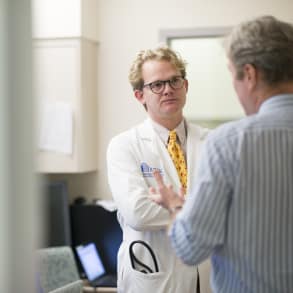MUSC Health medical oncologist John M. Wrangle, M.D., and cancer immunologist Mark P. Rubinstein, Ph.D. , discuss the promise of immunotherapy and their close collaboration that has led to a clinical trial of a novel combination immunotherapy for non-small cell lung cancer.
More at Progressnotes, MUSC’s Medical Magazine
JOHN WRANGLE: I think the therapies that people typically associate with the treatment of metastatic solid tumor malignancies is chemotherapy-- toxic drugs that are intended to directly kill tumor cells. These therapies are associated with a list of side effects that most people have becomes sort of familiar with-- hair loss, problems with blood counts, nausea, fatigue. Immunotherapy is a completely different paradigm. The objective of the drugs that we administer are to stimulate activity on the part of the immune system as opposed to directly targeting the cancer itself. So when these drugs are administered, the ultimate killing of the tumor is accomplished by the patient's own immune system. MARK RUBINSTEIN: Much like we would use a vaccine to illicit the body's natural defense against a virus such as polio or measles, we're trying to enlist the immune system to target cancer cells. And I think a really important concept that is being more appreciated now is that cancer cells have mutations. They have genetic alterations. And those alterations lead to there being specific differences on the cell surface of a cancer cell. And we can educate or program the immune system to recognize those differences and with really great specificity to target the cancer cells and not the healthy normal cells. JOHN WRANGLE: So I collaborate with Mark Rubenstein. He is a PhD researcher and I have an M.D. I think it's a really important thing for universities and cancer centers to understand sort of the power of these kinds of collaborations. And really having a basic scientist reaching out to the clinic and a clinician reaching out to the basic science, you really are able to find a lot of places where you experience a synergy of a relationship, where one plus one equals more than two. It's a tremendously effective relationship, very scientifically generative. And the success of the relationship is evidenced by the success of our clinical trial that we've written together. MARK RUBINSTEIN: Perhaps specifically one of the really good things about the Medical University of South Carolina from the perspective of myself as a basic researcher is that there's an environment that puts basic researchers in very close proximity with clinicians. So this really creates a very good atmosphere where the most urgent clinical questions become very apparent to basic researchers and vice versa. And I think it creates an environment where there's really great synergy. JOHN WRANGLE: The aim of this clinical trial is to increase the number of patients who experience benefit from immunotherapy. The idea of the clinical trial is to combine a second form of immunotherapy. The drug that we're combining with nivolumab is called ALT-803, and it's a reagent that is based on IL-15. It's a modified version of a cytokine that's made naturally in the body. It is intended to stimulate t-cell growth, proliferation, and activation. MARK RUBINSTEIN: There are several things that we would like to establish with this clinical trial. Foremost from a clinical perspective, we would like to establish the therapy is safe and that there is benefit to the patients. Second, we want to understand the mechanisms and the biology of how the therapy works. And third, we'd like to apply that knowledge to hopefully developing better therapies in the future. JOHN WRANGLE: It is very compelling rationale to want to get new therapies into the clinic to benefit patients for whom therapies may not be good enough or effective enough, and to try and really push the envelope in terms of what we're doing to improve cancer care.






